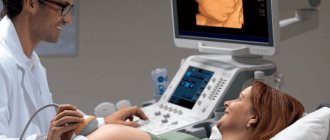What is perinatal screening?
This is a set of examination methods that help verify the normal development of the child. During the entire period, the expectant mother is prescribed a screening ultrasound twice together with a biochemical blood test.
What are the most common pathologies detected in the development of the neural tube?
- The first screening is carried out at 10-12 weeks. The indicators of this procedure help diagnose Down and Edwards syndrome (screening reveals trisonomies of 18 and 21 chromosomes);
- The second screening takes place at 18-21 weeks;
- Anencephaly;
- Spina bifida;
- Other.
What abnormalities does ultrasound show?
Ultrasound at the initial stage of pregnancy can detect or exclude the presence of severe genetic abnormalities.
List of main anomalies:
- Down syndrome is one of the most common genetic pathologies, diagnosed in 1 child out of 700 babies. When performing an ultrasound, you can see an increase in TVP, the face has a blurry outline, the bones of the base of the nose are poorly visible.
- Deviations in the formation of the neural tube.
- Omphalocele is the movement of some organs into the hernial cavity, which is located on the anterior wall of the peritoneum.
- Patau syndrome is a malfunction in chromosome 13, the anomaly occurs in 1:10 thousand cases, the disease is accompanied by various functional failures of internal organs, so most babies die within 2–6 months. In this case, an ultrasound shows a rapid pulse, an abnormal structure of the cerebral hemispheres and tubular bones.
- Edwards syndrome is a malfunction in chromosome 18, the pathology most often develops in women who give birth late. Ultrasound diagnostics show a weak and rare pulse, the base of the nose is not visible, and 1 artery is missing in the umbilical cord.
- Triploidy is a genetic malfunction, the fetus has 3 sets of chromosomes instead of two, the disease is accompanied by numerous pathological processes.
- Cornelia de Lange syndrome is a genetic disease, detected in 1 out of 10 thousand babies, accompanied by various physical and mental abnormalities.
- Smith-Opitz syndrome - the disease develops against the background of metabolic failures, the child develops autism, mental retardation, pathology is detected in 1 child out of 30 thousand.
As you can see, severe genetic anomalies are quite rare; not all of them are fatal to the fetus, but they negatively affect the future viability of the newborn.
Perinatal screening: basic diagnostic methods
- Ultrasound. Using special equipment, a specialist examines the image, assessing the general condition of the fetus and making the necessary measurements.
- Dopplerography during pregnancy. Fetal Dopplerography is a subtype of ultrasound, which is performed in a similar way. This diagnostic method allows specialists to understand the correct functioning of blood flow in the umbilical cord.
- Cardiotocography (CTG). It is carried out in parallel with ultrasound. The sensor is attached to the stomach in a place where the baby's heartbeat can be clearly heard.
- Blood chemistry. Determines the likelihood of serious diseases in the baby by analyzing the number of individual types of protein in the blood of the expectant mother.
- Invasive methods. Used only in cases of high probability of genetic abnormalities.
At risk are:
- Age above 35 years.
- Taking drugs dangerous to the fetus.
- For women who have had frozen pregnancies or miscarriages.
- Having a family history of hereditary abnormalities of fetal development.
- Having conceived children from a close relative.
- Parents exposed to radiation before conception.
Preparing for a screening examination?
Before the procedure itself, a pregnant woman undergoes a survey about: weight, age, past pregnancies and births, previous diseases, etc.
Recommendations before screening
Positive attitude. Stress often worsens performance. You should also avoid intimate relationships 4 days before diagnosis. For biochemical analysis, you should not eat food 3 hours before blood sampling. During an abdominal examination, you should definitely drink one glass of plain water half an hour before the procedure.
Who needs to be screened?
In our country, the first prenatal examination is voluntary, but in practice almost all women are prescribed to undergo it.
It is definitely indicated for pregnant women who:
If a woman does not belong to a risk group for these indications, but wants to make sure that everything is fine with her child, she should also conduct such a study.
What myths are associated with pregnancy screening?
No. 1: Ultrasound is dangerous for the child
Many women express the opinion that ultrasound is excessively dangerous for the fetus. There is an opinion about screening that this procedure disrupts the functioning of the nervous system and is very annoying for the baby. Is this true or is it still a prejudice among pregnant women?
Is ultrasound harmful during pregnancy? Doctors are categorically against these statements. Experts say that all medical equipment is currently safe for babies. Official medicine is convinced and insists that ultrasound diagnostics be carried out for all pregnant women without exception. If you make a diagnosis in time, you can correct some deviations.
Among specialists, the first screening during pregnancy is considered necessary.
During diagnosis:
- the number of embryos will be determined;
- the gestational age is specified;
- the absence of developmental anomalies is confirmed;
- the amount of subcutaneous fluid in the baby’s neck is analyzed;
- The presence or absence of the nasal bone is examined.
Doctors around the world are absolutely convinced that prenatal screenings are necessary for all pregnant women, especially if this is a woman’s first pregnancy.
No. 2: “I and/or my husband have no abnormalities in our family - why do I need these procedures?”
Many pregnant women are absolutely sure that if they have good heredity, no problems will arise.
Of course, first of all, women from the risk group should undergo prenatal screening: over 35 years of age (this age period is very dangerous for the development of pathologies), with chronic diseases, for example, diabetes, and with children with genetic diseases.
Let us repeat once again that doctors consider perinatal screenings mandatory.
No. 3: Biochemical screening results are unreliable
Pregnant women are convinced that it is absolutely impossible to give accurate results using biochemical analysis, because many circumstances influence the final assessments. Why then waste money and nerves? Why inject veins again?
Biochemical screening is a diagnostic that helps identify women who are at risk. A hormone that exists exclusively in the body of a pregnant woman is analyzed. Doctors are interested in two things: a unique protein in the blood of pregnant women, PAPP-A, and the free beta subunit.
The results are evaluated thanks to a program that compares the result with the norm.
The first biochemical screening can detect severe chromosomal abnormalities.
In the second trimester, after screening, specialists are interested in the hormones estriol and human chorionic gonadotropin (hCG), as well as protein (AFP) produced in the fetal liver. If protein levels are too high, then abnormalities in the development of major organs are possible. But keep in mind that elevated AFP levels are normal in multiple pregnancies. The hormone estriol helps doctors understand that the placenta is working normally and the baby is getting everything it needs, the whole body and its defenses are functioning perfectly. All results of the second analysis are processed by a computer program to understand where there are deviations from the norm. For example, low levels of estriol and AFP, and high hCG - there is a possibility of Down syndrome.
After the second screening, all results are correlated with the first.
If deviations are determined, the expectant mother visits a geneticist. The specialist may decide to order additional tests. But they are no longer safe, so they are recommended to be done in case of a high probability of pathology. The main thing: all examinations are carried out only with the approval of the pregnant woman.
Bottom line: all conclusions are made by a specialist, taking into account a complex of individual factors.
No. 4: Possible deviations in the child’s development cannot be corrected
Unfortunately it's true. Experts will not be able to help the child if, after all the tests, the baby is diagnosed with fetal anomalies. Therefore, very often overly emotional women refuse to undergo screening.
What is better in this situation - to refuse research and be in the dark for the entire nine months of pregnancy or to undergo screening - is an individual matter.
No. 5: “I don’t want to hear a bad report from doctors”
The most compelling argument against the screening procedure. Expectant mothers are terribly afraid of hearing something bad. Many people have a fear of medical errors, because there have often been cases when diagnostic results were false positive or false negative.
For example, after screenings, a woman was given a diagnosis that the child would be born with Down syndrome, but, fortunately, the baby was born absolutely healthy. Of course, these are precisely the situations in life that do not have a positive impact on a woman’s mood during the remaining period of pregnancy, and constant stress and anxiety have a bad effect on the baby’s health.
It must be remembered: the results of prenatal screenings are not the basis for making a diagnosis; doctors use screening to determine probable risks.
Standards for 1st screening
Of course, if you have strong nerves, you can pass all the necessary tests and go quietly watch a movie or go to the park to eat ice cream. And you will receive the result with comments in a few days, at an appointment with a gynecologist.
But where have you seen a pregnant woman with such nerves? In order not to exhaust yourself while waiting, it is easier to find a table with normal indicators, and even decipher all the data obtained in the laboratory yourself. Of course, you won’t make far-reaching predictions, but at least you’ll figure out whether everything is okay with your baby or not.
Such standards are easy to find on the Internet, and they are no secret - they are approved by experienced doctors. Here they are - you can check your details, take a breath of relief - and go buy your ice cream with peace of mind.
Norms of hCG and PAPP-A
These indicators are the norm
Ultrasound standards for 1 screening
During this examination, the doctor pays special attention to the CTE (that is, the coccygeal-parietal size, which on your line should be from 45 mm), as well as the heart rate (from 150 to 175 beats).
Coccyx parietal size (CTR)
11 weeks - 34-50 mm
12 weeks - 42-59 mm
13 weeks - 51-75 mm
Neck thickness (TCT)
11 weeks - 0.8-2.2 mm
12 weeks - 0.8-2.5 mm
13 weeks - 0.8-2.7 mm
Biparietal size
11 weeks - 13-21 mm
12 weeks - 18-24 mm
13 weeks - 20-28 mm
When is screening not recommended during pregnancy?
Contraindicated for:
- elevated body temperature;
- acute respiratory infections, ARVI;
- any viral or infectious diseases;
- stressful condition.
Why? It turns out that even the most minor changes in the body, the slightest cold or runny nose, not to mention serious illnesses, can greatly affect the performance. Therefore, before donating blood, you need to visit a gynecologist.
A woman has every right to refuse to conduct any diagnostics and any tests. A woman decides for herself what she needs and what she doesn’t. It should be understood that there is no real help for poor screening results. If the anomalies are confirmed, only future parents will be able to make a decision after weighing all the pros and cons.











